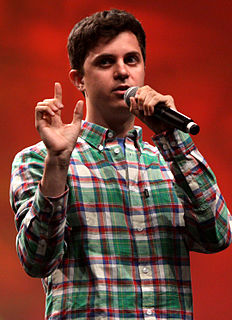A Quote by Ludwig Wittgenstein
Think of the tools in a tool-box: there is a hammer, pliers, a saw, a screwdriver, a rule, a glue-pot, nails and screws.--The function of words are as diverse as the functions of these objects.
Related Quotes
Before I was married, I didn't consider my failure to manage even basic hand tools a feminist inadequacy. I thought it had more to do with being Jewish. The Jews I knew growing up didn't do 'do-it-yourself.' When my father needed to hammer something he generally used his shoe, and the only real tool he owned was a pair of needle-nose pliers.
Personally, I think government is a tool, like a hammer. You can use a hammer to build or you can use a hammer to destroy; there is nothing intrinsically good or evil about the hammer itself. It is the purposes to which it is put and the skill with which it is used that determine whether the hammer's work is good or bad.
In a sense, every tool is a machine--the hammer, the ax, and the chisel. And every machine is a tool. The real distinction is between one man using a tool with his hands and producing an object that shows at every stage the direction of his will and the impression of his personality; and a machine which is producing, without the intervention of a particular man, objects of a uniformity and precision that show no individual variation and have no personal charm. The problem is to decide whether the objects of machine production can possess the essential qualities of art.
The ethical rule is from Samuel Johnson who believed that maintenance of easily removable ignorance by a responsible office holder was treacherous malfeasance in meeting moral obligation. The prudential rule is that underlying the old Warner & Swasey advertisement for machine tools: "The man who needs a new machine tool, and hasn't bought it, is already paying for it". The Warner & Swasey rule also applies, I believe, to thinking tools. If you don't have the right thinking tools, you, and the people you seek to help, are already suffering from your easily removable ignorance.
We’re every age at once and tucked inside ourselves like Russian nesting dolls. My mother is an 8 year old girl. My grandson is a 74 year old retiree whose kidneys just failed. And that’s the glue between me and you. That’s the screws and nails. We live in a house made of each other and if that sounds strange that’s because it is.
As a technology, the book is like a hammer. That is to say, it is perfect: a tool ideally suited to its task. Hammers can be tweaked and varied but will never go obsolete. Even when builders pound nails by the thousand with pneumatic nail guns, every household needs a hammer. Likewise, the bicycle is alive and well. It was invented in a world without automobiles, and for speed and range it was quickly surpassed by motorcycles and all kinds of powered scooters. But there is nothing quaint about bicycles. They outsell cars.







































